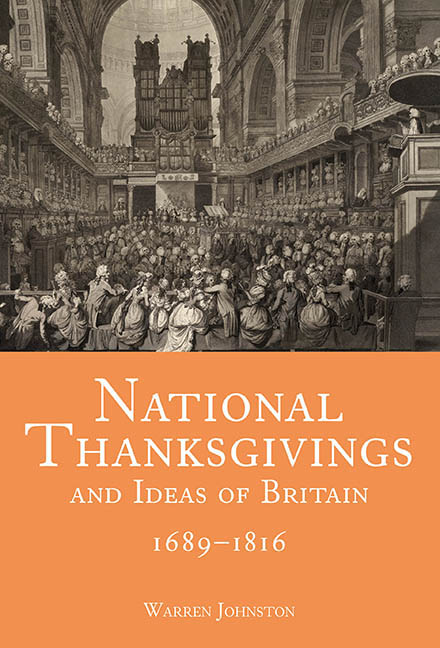Book contents
- Frontmatter
- Dedication
- Contents
- Acknowledgements
- Notes on elements of the text
- List of general thanksgiving days 1689–1816
- Introduction
- 1 Sermons and thanksgiving-day sermons in the long eighteenth century
- 2 Thanksgiving-day sermons – purposes and meanings
- 3 ‘The Palladium of our Safety’ – Providence and Britain
- 4 Political theory and principles
- 5 ‘This Carping Age’ – the politics of unity and discord
- 6 War
- 7 Costs of war and consequences of peace
- 8 Commerce and Empire
- 9 Anglicanism, dissent, anti-Catholicism, and infidelity
- 10 Others and Britons
- Conclusion
- Appendix A Thanksgiving-day preachers’ and sermon details
- Appendix B Denominational breakdown of thanksgiving-day preachers
- Appendix C Main scriptural texts used for thanksgiving-day sermons
- Bibliography of primary sources
- Bibliography of secondary sources
- Index
9 - Anglicanism, dissent, anti-Catholicism, and infidelity
Published online by Cambridge University Press: 02 May 2020
- Frontmatter
- Dedication
- Contents
- Acknowledgements
- Notes on elements of the text
- List of general thanksgiving days 1689–1816
- Introduction
- 1 Sermons and thanksgiving-day sermons in the long eighteenth century
- 2 Thanksgiving-day sermons – purposes and meanings
- 3 ‘The Palladium of our Safety’ – Providence and Britain
- 4 Political theory and principles
- 5 ‘This Carping Age’ – the politics of unity and discord
- 6 War
- 7 Costs of war and consequences of peace
- 8 Commerce and Empire
- 9 Anglicanism, dissent, anti-Catholicism, and infidelity
- 10 Others and Britons
- Conclusion
- Appendix A Thanksgiving-day preachers’ and sermon details
- Appendix B Denominational breakdown of thanksgiving-day preachers
- Appendix C Main scriptural texts used for thanksgiving-day sermons
- Bibliography of primary sources
- Bibliography of secondary sources
- Index
Summary
This chapter will look at the religious issues and concerns that were discussed in thanksgiving-day sermons. This will not include a consideration and analysis of fine theological points or doctrinal intricacies but, instead, will focus particularly on preachers’ ideas on relationships among and between denominations of British Protestants, and their perception of the major threats to British Protestantism in the long eighteenth century. These include consideration of the place of the Church of England – and responses to dissent – presented by Anglican clergy, and the views of dissenting clergy regarding their position within the ecclesiastical structure of Britain. It will also examine ideas about the significance of religious freedom and the importance of religious unity for British Christianity in the eighteenth century. Finally, it will analyse the relevance of anti-Catholicism as a prominent theme from the early modern period, and then perceptions of the growth of irreligion as a danger gaining strength in the later eighteenth and early nineteenth centuries.
Anglican preachers and Anglicanism
Anglican clergy preached a majority of the thanksgiving-day sermons, so it should be no surprise that they presented some strong opinions regarding the importance of the Established Church within society. In addition to their defence and promotion of the Church of England, some preachers also criticised dissenters and dissenting practices. Though the pitched struggles and provocative rhetoric between Anglican and nonconforming clergy lessened in the period following the Revolution of 1688– 1689, there was still much at stake as the Church of England (and its episcopal counterpart in Ireland) tried to protect and solidify its pre-eminence within British Christianity during the eighteenth century. Though the suspension of the penal laws against Protestant dissenters helped to lower the stakes in religious disagreements between churches and denominations, there was still much to play for in the effort to survive in the competitive landscape of British Christianity: though persecution may have ended, turf wars continued.
The belief in the Church of England as properly reformed in its practices and composition was an idea that continued from the Reformation and Restoration into the long eighteenth century, and Anglican clergymen persisted in reminding their audiences of their Church's characteristics. ‘Our Doctrines are True, our Worship, Hierarchy and Ceremonies Pure and Primitive, and every part of our Religion Sincere and without Guile’, Thomas Comber declared in 1697.
- Type
- Chapter
- Information
- National Thanksgivings and Ideas of Britain, 1689–1816 , pp. 231 - 259Publisher: Boydell & BrewerPrint publication year: 2020



